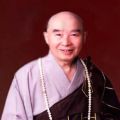Chapter 3: The Author's Own Experience with Buddhism When I was a young student in Nanjing, I did not believe in any religion. I went to church with some classmates to learn about Christianity. Although I tried to understand it, I could not find a way to accept it. My favorite religion at that time was Islam because its emphasis was on moral principles and ethics, and I thought that this was rare among religions. When I encountered Buddhism back then, the monks were not very convincing. Therefore, I could not accept Buddhism either and it was the one I resisted the most. I was too young at that time and had not met a true practitioner.
After I arrived in Taiwan, I heard of Professor Dong-Mei Fang, who was then a famous philosopher and a professor at the National Taiwan University. Having become an admirer of his, I wrote him a letter asking about taking a class from him at the university. Professor Fang was only in his forties at that time. He invited me to his house and told me, "Nowadays in school, professors do not act like professors, and students do not act like students either. If you come to the university and expect to learn something, you will be sorely disappointed." When I heard this, I was pretty upset since he had basically poured cold water over my plans. Finally, he told me: "Well, why don't you come to my house every Sunday, and I will give you personal instruction for two hours." I could not believe that he was so compassionate towards me. I learned about philosophies at Professor Fang's small table in his little living room, one on one. This was extremely precious to me. He introduced the philosophies of the West, China, India and finally Buddhism. He taught me that Buddhism is the pinnacle of the world's philosophy and that it provides the greatest enjoyment for humanity. What he told me was fascinating and soon I realized that Buddhism contained something magnificent. I started to visit the temples in Taipei. However, the monks I met in those temples just could not clearly explain Buddhism to an intellectual skeptic like me. However, the monks are much better in teaching Buddhism today. Then I set my first sight on Shan-Dao-Si, which was a large temple in Taipei with a vast collection of sutras. During that period of time, the wide publication and circulation of Buddhist books was very rare. The monks at Shan-Dao-Si were extremely kind to me as they allowed me to borrow many of the precious and rare sutras. This was a great help to me. Soon after I started to learn Buddhism seriously, I was fortunate to meet Master Zhang-Jia. He was a well-accomplished Esoteric practitioner who taught and guided me in my study and practice. Just like Mr. Fang, he taught me two hours every week for three years until he passed away. I then went to Taizhong to follow Mr. Bing-Nan Lee and started studying and practicing with him.
Buddhism is a special kind of knowledge; it is not a religion. In order to derive true benefit from it, we have to understand it's true nature. I have the utmost respect for Buddhism and I believe Buddha Shakyamuni to be the foremost educator in the history of the world. He was just like Confucius in that he taught everyone tirelessly and without discrimination.

